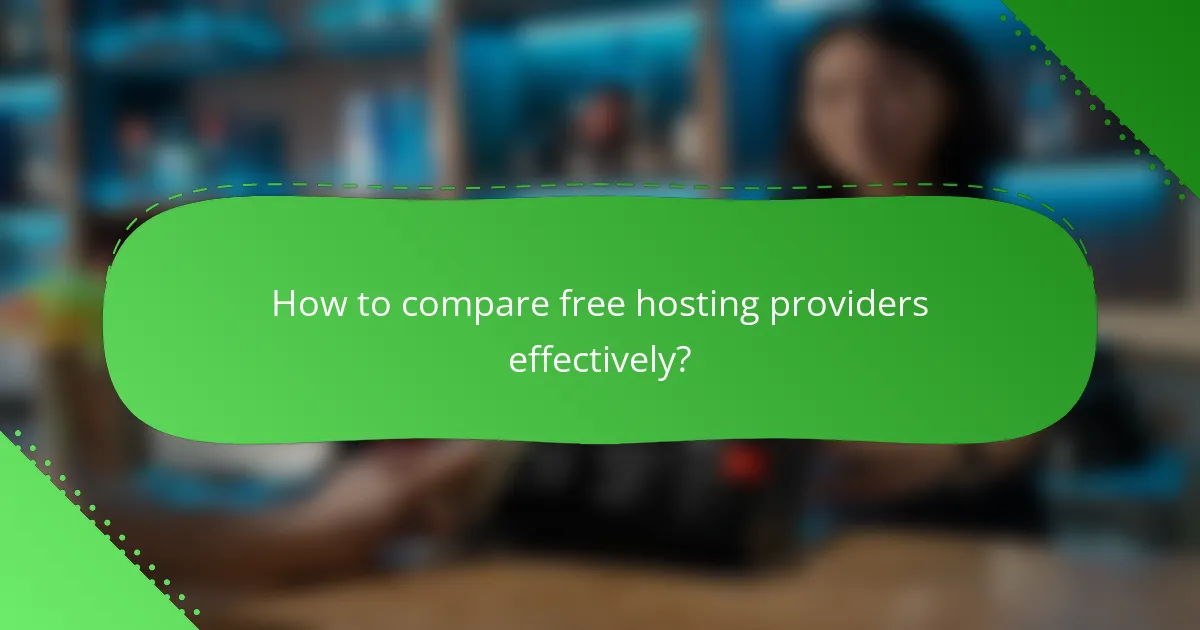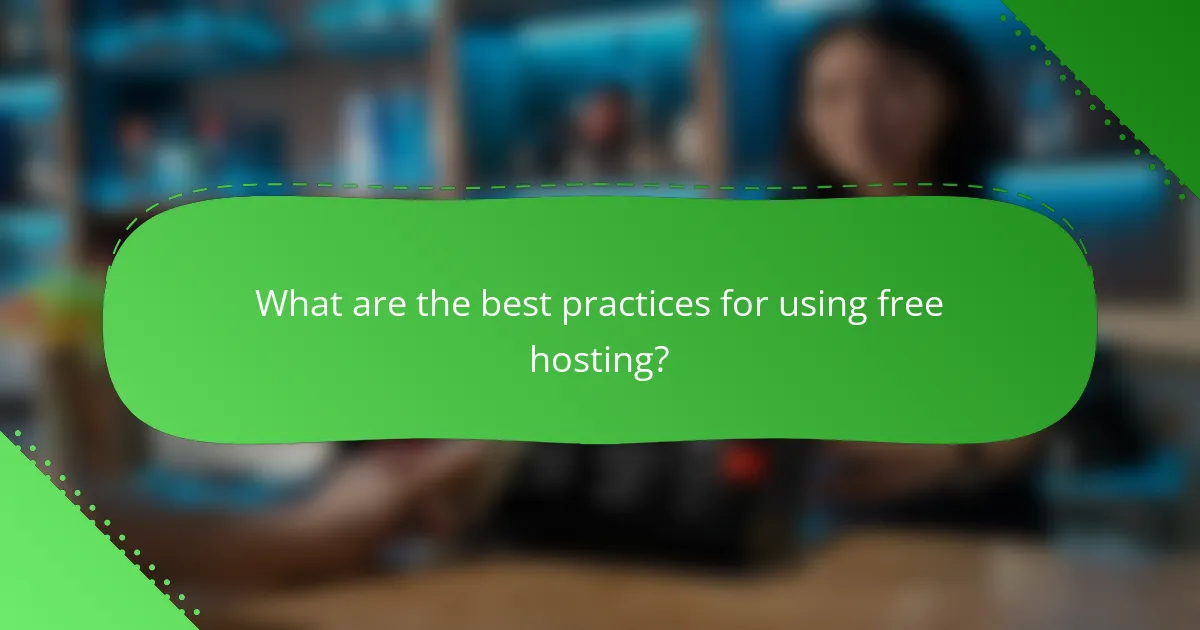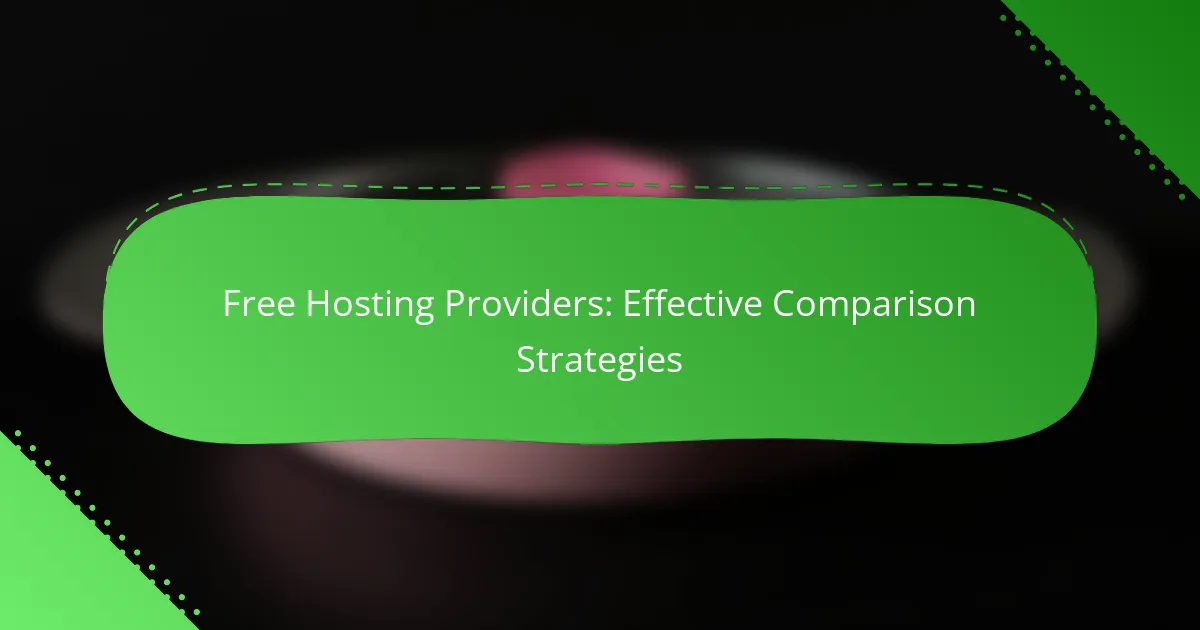Choosing the right free hosting provider can significantly impact your online presence, whether for personal projects or small businesses. To make an informed decision, it’s essential to compare key factors such as storage limits, bandwidth, uptime, and customer support. By focusing on these elements, you can identify a provider that aligns with your specific needs while remaining budget-friendly.

What are the best free hosting providers in the US?
The best free hosting providers in the US offer a range of features suitable for personal projects, small businesses, or learning purposes. Key considerations include storage limits, bandwidth, ease of use, and customer support options.
InfinityFree
InfinityFree is a popular choice for those seeking unlimited disk space and bandwidth without any cost. It supports PHP and MySQL, making it suitable for dynamic websites and applications.
One downside is the lack of customer support, which can be a challenge for beginners. Users should also be aware of potential downtime and limitations on resource usage.
000webhost
000webhost offers a free plan with 1 GB of disk space and 10 GB of bandwidth, making it a solid option for small websites. It includes a website builder and supports PHP and MySQL.
However, users may experience downtime and ads on their sites. It’s advisable to consider upgrading to a paid plan for better reliability and features.
Freehostia
Freehostia provides a free hosting plan with 250 MB of disk space and 6 GB of monthly bandwidth. It is user-friendly and offers a one-click installer for popular applications.
While the storage is limited, it is a good option for small personal projects. Users should keep in mind the restrictions on resource usage and consider their future needs.
ByetHost
ByetHost offers free hosting with 1 GB of disk space and 50 GB of bandwidth, along with support for PHP and MySQL. It features a user-friendly control panel and a community forum for assistance.
Despite its advantages, users may encounter slower speeds compared to paid services. It’s important to evaluate whether the free plan meets your long-term requirements.
Hostinger Free Plan
Hostinger’s free plan is ideal for those looking to start small, offering 300 MB of disk space and 3 GB of bandwidth. It includes a website builder and is known for its ease of use.
However, the limitations on storage and bandwidth may not support larger projects. Users should assess their needs and consider upgrading if they plan to expand their website in the future.

How to compare free hosting providers effectively?
To compare free hosting providers effectively, focus on key factors such as storage, bandwidth, uptime, and customer support. Evaluating these elements will help you identify which provider best meets your needs without incurring costs.
Evaluate storage and bandwidth
Storage and bandwidth are crucial for any hosting service. Free providers often offer limited storage, typically ranging from a few hundred megabytes to a couple of gigabytes, which may not suffice for larger websites. Bandwidth limits can also vary, affecting how much data can be transferred to and from your site.
When assessing these factors, consider your website’s requirements. For instance, a simple blog may function well with minimal storage and bandwidth, while an e-commerce site will likely need more resources. Always check for any hidden fees that may apply if you exceed these limits.
Assess uptime guarantees
Uptime guarantees indicate how often a hosting service is operational. Most reputable free hosting providers aim for at least 99% uptime, but many may fall short, leading to potential downtime. This can negatively impact your website’s accessibility and user experience.
Look for providers that offer clear uptime commitments and check user reviews for real-world performance. If uptime is critical for your project, consider whether a paid option might provide more reliable service.
Check customer support options
Customer support is vital, especially when using free hosting services, which may offer limited assistance. Many free providers rely on community forums or email support, which can lead to delays in resolving issues. Assess the availability and responsiveness of support channels before committing.
Consider whether you prefer live chat, phone support, or email assistance. A provider that offers robust support can save you time and frustration, especially if you encounter technical difficulties. Always read reviews to gauge the quality of customer service before making your choice.

What features should you prioritize in free hosting?
When selecting a free hosting provider, prioritize features such as website builder availability, domain name options, and security features. These elements significantly impact your site’s functionality, branding, and safety, making them crucial for a successful online presence.
Website builder availability
A website builder allows users to create and manage their sites without extensive coding knowledge. Many free hosting providers offer integrated website builders, which can range from simple drag-and-drop interfaces to more complex systems with customizable templates. Look for platforms that provide user-friendly tools to streamline the design process.
Consider the flexibility of the builder as well. Some may limit customization options or impose restrictions on the number of pages you can create. Aim for a builder that balances ease of use with sufficient features to meet your needs.
Domain name options
Free hosting often comes with limitations on domain names, such as subdomains instead of custom domains. While a subdomain (e.g., yoursite.provider.com) can be a good starting point, having a custom domain (e.g., yoursite.com) enhances professionalism and brand recognition. Check if the provider offers the option to upgrade to a custom domain at a reasonable cost.
Additionally, some free hosting services may include domain registration as part of their package, while others may require you to purchase a domain separately. Evaluate these options to ensure you can establish a strong online identity without excessive costs.
Security features
Security is a critical aspect of any website, even on free hosting platforms. Look for providers that offer basic security features such as SSL certificates, which encrypt data transmitted between your site and its visitors. This is particularly important if you plan to collect any personal information.
Also, consider the provider’s backup and recovery options. Regular backups can save you from data loss due to technical failures or security breaches. Ensure the hosting service has a clear policy on backups and what measures they take to protect your site from threats.

What are the limitations of free hosting services?
Free hosting services often come with significant limitations that can affect website performance and user experience. Users should be aware of constraints such as storage limits, customer support availability, and mandatory advertising requirements.
Storage caps
Most free hosting providers impose strict storage limits, typically ranging from a few hundred megabytes to a couple of gigabytes. This can restrict the amount of content you can upload, including images, videos, and other files.
When choosing a free hosting service, consider your website’s needs. If you plan to host a blog or portfolio with numerous media files, you may quickly exceed these limits, necessitating an upgrade to a paid plan.
Limited customer support
Free hosting services generally offer minimal customer support, often relying on community forums or automated help centers. Response times can be slow, and critical issues may go unresolved for extended periods.
Before committing to a free hosting provider, assess the available support options. If you anticipate needing assistance, consider whether the lack of direct support could hinder your website’s operation.
Advertising requirements
Many free hosting platforms require users to display ads on their websites, which can detract from the user experience and affect your brand’s image. These ads are often placed prominently and can be difficult to remove without upgrading to a paid plan.
Evaluate how advertising might impact your site’s aesthetics and functionality. If maintaining a professional appearance is crucial, you may want to explore alternatives that allow for ad-free hosting, even at a low cost.

How do free hosting providers monetize their services?
Free hosting providers typically monetize their services through advertisements, upselling premium features, and data collection. These strategies allow them to offer no-cost options while generating revenue from users and their visitors.
Advertisements on user sites
Many free hosting services display advertisements on the websites they host. This can include banner ads, pop-ups, or sponsored content, which can detract from the user experience and may not align with the site’s branding.
Website owners should consider the impact of these ads on their audience. If the ads are intrusive or irrelevant, they may drive visitors away, potentially harming the site’s reputation and traffic.
Upselling premium services
Free hosting providers often offer basic services for free but charge for advanced features, such as increased storage, custom domain names, or enhanced security. This upselling strategy encourages users to upgrade as their needs grow.
When evaluating free hosting options, users should assess what features are included for free and what costs are associated with premium upgrades. Understanding these costs upfront can help avoid unexpected expenses later.
Data collection
Free hosting providers may collect user data, such as website traffic and user behavior, to sell to third parties or use for targeted advertising. This practice raises privacy concerns and can affect user trust.
Website owners should review the privacy policies of free hosting providers to understand how their data will be used. It’s crucial to ensure that any data collection practices align with their values and the expectations of their audience.

What are the best practices for using free hosting?
To effectively use free hosting, prioritize understanding its limitations and benefits. Free hosting can be a great starting point for personal projects or small businesses, but it often comes with restrictions that can impact performance and reliability.
Understand the limitations of free hosting
Free hosting typically offers limited storage, bandwidth, and support. Users may encounter slower loading times and potential downtime, which can affect user experience. It’s crucial to assess whether these limitations align with your project’s needs.
Evaluate the features offered
When comparing free hosting providers, look for essential features such as website builders, domain options, and SSL certificates. Some platforms may offer additional tools like email hosting or content management systems, which can enhance your site’s functionality.
Consider the upgrade options
Many free hosting services provide tiered plans that allow for easy upgrades. If you anticipate growth, choose a provider that offers scalable solutions, enabling you to transition smoothly to paid plans without significant disruptions.
Check for ads and branding
Free hosting often includes ads or branding from the provider on your site. This can detract from your brand’s professionalism. Review the terms to understand how these elements might affect your site’s appearance and user perception.
Read user reviews and testimonials
Before committing to a free hosting provider, research user experiences. Look for reviews that highlight reliability, customer support, and overall satisfaction. This can help you identify potential issues and make a more informed decision.
